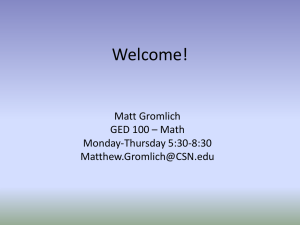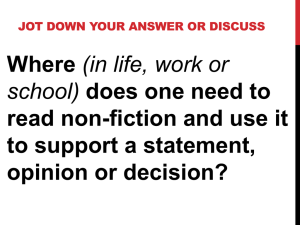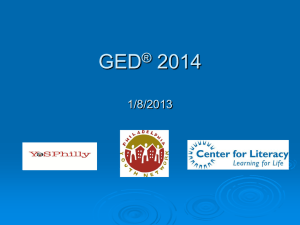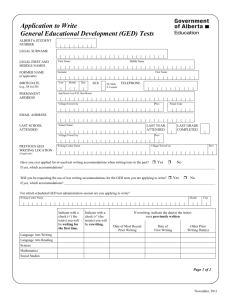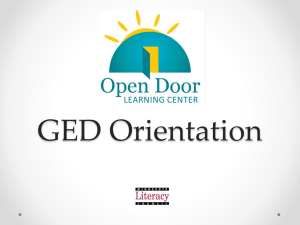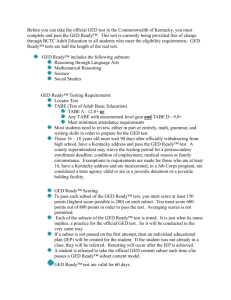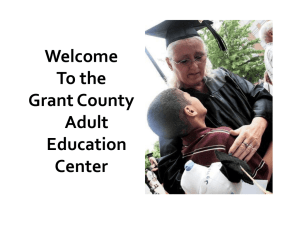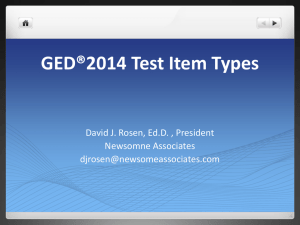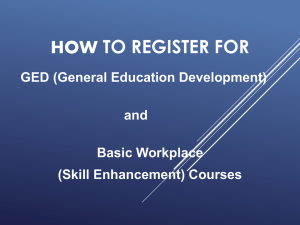GED Orientation
advertisement
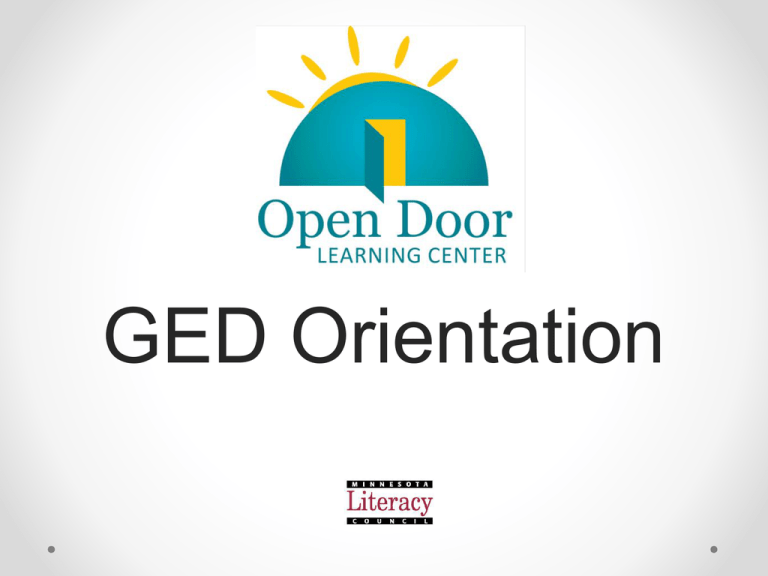
GED Orientation Introductions • • • • What is your name? Where are you from? What do you want to do AFTER your GED? If you had to describe your personality, what would you say? What subjects are on the GED test? • • • • • Language Arts, Reading Language Arts, Writing Social Studies Science Math Which subjects have 2 parts? • Math o 25 questions with the calculator o 25 questions without the calculator • Writing o 50 multiple choice Grammar questions o 45 minute Essay What score do you need to pass each test? What average score do you need to pass your GED? How much does the test cost? $100 (in Mpls) Where do you go to take the test? South Campus ABE 2225 East Lake Street Registration and testing times every Monday and Wednesday Graduation ceremonies in June and January How long does it take to complete all five timed tests? Approximately 7 hours Writing 2 hours Math 90 minutes Science 80 minutes Social Studies 70 minutes Reading 65 minutes How long does it take for someone to get his/her GED? It depends… Can you take the tests more than once? What are the five scoring categories for the essay? 4 Did I answer the question? Did I organize my thoughts logically and into paragraphs? Did I include examples and details to explain what I meant? Did I use correct grammar? Did I use correct vocabulary? E f f e c t i v e 3 2 A d e q u a t e M a r g i n a l Passing 1 I n a d e q u a t e When is the test changing? January 2, 2014 Last day to test is st December 31 Recent Graduates K a s h e l "The most important thing I learned through this process is to not give up. It took time, but the time I put in was worth it." O r l a n d o "The most important thing I learned through this process is that I am smarter than I thought. Me not graduating high school kinda discouraged me. However, by me going through this process, I learned I got it." About our program GED+ Open Door- Lake Street GED Classes are designed to not only prepare you to pass your GED, but to give you the tools for the next chapter in your life.Academic Organizational Skills Soft Skills Critical Thinking Skills Inter-personal Skills Skills Class schedule Monday Social Studies 10:00am-12:00pm Tuesday Science Wednesday Thursday Math Literacy 10:00am-12:00pm (Reading and Writing) 10:00am to 1:00pm 10:00am-12:00pm Book Club 12:00pm-1:00pm Approximately 80% of students who participate in Book Club get level gains. Ice-Breaker • • • • • • • Expectations Be ready to learn. Come prepared to pay attention and participate in class. Leave your personal business at the door. Be respectful of others. This includes being respectful of their opinions, thoughts, and feelings. Do not snicker or laugh at others for asking questions or for their wrong answers. Be mindful of different learning styles. Everyone learns differently and at a different pace. Get here on time. Wait your turn to talk. It is important to listen before you speak. Do not talk when the teacher is talking. Do not engage in side conversations. Turn phones to off or vibrate. Answer your phone outside of the classroom only if it is an emergency. Turn iPods and other electronics off. • All conversation (asking for test scores, requesting resources, catching up with your neighbor, etc.) should happen on break or before/after class. • If you smoke, please do so outside the and away from the door. Thanks! Attendance Policy Come every day. On time. If you come ON TIME 15 out of 20 days in the unit (or 75% of your scheduled classes), you will receive a free educational resource of your choice from our “stash.” If you have perfect attendance, you will get a snazzy certificate and be honored in front of your classmates. How does this relate to the classroom? "Success seems to be connected with action. Successful men keep moving. They make mistakes but they don't quit." How does this relate to the classroom? "The man who removes a mountain begins by carrying away small stones." ~Chinese proverb How does this relate to the classroom? “It's not that I'm so smart, it's just that I stay with problems longer.” ~Albert Einstein How does this relate to the classroom? "The real art of conversation is not only to say the right thing at the right place but to leave unsaid the wrong thing at the tempting moment." ~Dorothy Nevill How does this relate to the classroom? “Two monologues do not make a dialogue.” ~Jeff Daly What does this mean? "Only in growth, reform and change... paradoxically enough... is true security to be found." ~Anne Morrow Lindbergh Inspiration… "Always continue the climb. It is possible for you to do whatever you choose if you first get to know who you are and are willing to work with a power that is greater than ourselves to do it." ~Oprah Winfrey Habits of Mind: Keys to Success in Learning Curiosity Do I ask “Why,” “How,” or “What If” questions? Habits of Mind: Keys to Success in Learning Respect for Evidence Do I listen carefully for others’ use of evidence, and do I include evidence to support my solutions and ideas? Habits of Mind: Keys to Success in Learning Persistence Do I keep going when I feel lost or discouraged while solving problems? Habits of Mind: Keys to Success in Learning Ownership In what ways do I show that my work is purposeful and important to me? Habits of Mind: Keys to Success in Learning Reflection Do I notice and analyze how and what I learn?
